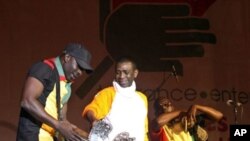Senegalese musician Youssou Ndour has brought his own version of the talent show "American Idol" to the capital Dakar. But this contest is helping to fight one of the country's biggest killers - Malaria.
Since the "Africa Live: Roll back Malaria" concert, in 2005, Youssou Ndour has been a committed activist in raising awareness about malaria prevention.
In June 2009, Ndour, along with Senegal's National Malaria Control Program and the American aid group, Malaria No More, started the Xeex Sibburu campaign.
The two-part project, which means "Fight Malaria" in Wolof, began with the distribution of over two million mosquito nets across the country. In March, its second phase began with a song contest.
The musical challenge was open to all Senegalese and attracted over 700 entries. Each contestant had to write their own version of the original song, which tells the story of a young man's personal struggle with malaria.
Power of music
The top ten finalists then performed in Dakar at Ndour's nightclub, Le Thiossane, alongside other big-named local artists such as Viviane, Souleymane Faye, Carlou D and Dread Maxim.
"Music is a language," said Ndour. "It is maybe the first language. It is about having the idea to bring the message to the music for the people. What we realize here is that people are affected by malaria, but at the same time they do not give very big importance about malaria."
Ndour says the program has encouraged more people to talk about malaria and use their bednets.
In Senegal, malaria is the leading cause of death for children under the age of five. About half of the cases reported to health services across the country are linked to malaria.
With five years left to meet the Millennium Development Goal of eradicating malaria in Africa, Senegal is well on its way to meeting this target.
Dr. Pape Moussa Thior is the head of the National Malaria Control Program in Senegal.
Thior says their goal has already been met. Since 2000, we have been trying to reduce the number of cases of morbidity and death by 50 percent, but we have actually lowered it by 85 percent.
Using music to deliver social messages is a powerful tool on this continent.
Thior says as Africans, they have rhythm in their blood. Everything we do, in terms of delivering messages, is done easily with sound and music.
If we can have a big singer, like Youssou Ndour, with his voice and his song, then we can touch the maximum number of people and it can help in the fight against malaria.
The ten finalists in the Xeex Sibbiru song contest ranged in age from 23 to 38 years old. They performed in musical styles as varied as rap and mbalax to reggae and salsa and sang in a variety of languages, from Wolof and Serer to Pulaar and French.
Cecilia Irma Gonsalves, a 27-year-old commercial agent from Dakar, was one of two women selected for the finals.
Gonsalves says her idea of an artist is not only the voice, because God gives the artist their voice. Rather, the essential part of an artist is in what they say.
She says this type of project is awakening the population. It is giving advice, but not only by criticizing, the way rappers do and which is sometimes necessary, but rather by providing solutions.
Gonsalves says someone who makes an album to sing just because they have a good voice, but leaves nothing in the lyrics, is not an artist. The real artist is someone who, in addition to their voice, has a message to deliver.
The importance of making this campaign a local endeavor is something Ndour believes is vital to ultimately stopping malaria for good. "When white people come in to talk about malaria, there is a gap. They say, these people come in from the outside and told me about what is happening here. It is difficult, because they say OK they are going to give money, they are going to give bed-nets and maybe they are coming back," he said.
"And I think, really, if the local people listen to local people, I think there can be big change. And when we talk to them, they understand. We have the words to tell them about the problem and the effect we have around the kids and the economy," he added.
Raising awareness
Traditional beliefs about how malaria is caught and treated have long persisted in Africa. Educating the population on the real effects of the disease is a major part of the battle.
Dr. Thior says that before when people had malaria that was not treated they would accuse their neighbors of witchcraft, or they would accuse people with whom they did not get along. It became a source of social conflict.
Thior says people would even believe that green mangoes triggered malaria, or that the sun was responsible. There were beliefs that were not rational, but very much engrained in the belief system. So it was vital to put in place messages, which fortunately today have allowed many people to better understand how malaria is transferred and what precautions they can take.
The Xeex Sibburu campaign hopes it can inspire other artists in other African countries to develop similar types of projects.
Dr. Thior says it has been shown that malaria is a hindrance to development. When someone is sick and cannot work there is an economic loss.
Over a 15 year period, he says it is estimated that Malaria costs Senegal 3.3 billion dollars in lost income. Thior says it is extremely important to fight Malaria because it is an enemy that will keep them from developing.
36-year-old Djibril Diop, a fisherman from outside Dakar, won the Xeex Sibburu contest. His version of the song will be produced by Youssou Ndour. The two will perform with Viviane at the Bercy concert in Paris later this week.
Musician Uses Power of Music to Help Senegal Fight Malaria




